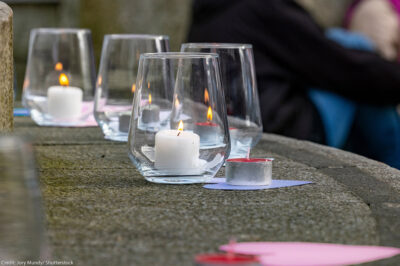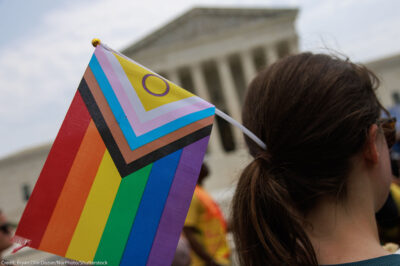At first glance I’m pretty unremarkable. I’m a middle-aged woman, and a single parent to a 22-year-old son. I was divorced after a marriage of almost 20 years. I have a successful career as an IT consultant for Fortune 500 companies. I havetwo dogs, I rent a home, I enjoy photography and music, and I live paycheck to paycheck just like millions of other Americans.

The thing that makes me unique is that I’m transsexual. More specifically, I’m a transsexual woman. My path to womanhood was admittedly “untraditional” and arguably a bit more difficult than most, but somehow that seems to make it all the more valuable to me. That single fact about me doesn’t make me better or worse than anyone else. It doesn’t make me more or less worthy of basic human rights. It doesn’t define me. Unfortunately, there is a world of people that choose to disagree.
Some labels become defining labels in that they trump all the others. Somehow, the moment that others learn about my unique pedigree all those other important facts about me and my life seem to get called into question, or forgotten altogether. Even more disturbing, however, is the fact that to acknowledge that single fact about myself is to forfeit basic human rights that most take for granted in this country. Suddenly, I can be fired from my job for no reason related to job performance. I can be denied housing, and health insurance. I can become the target of harassment or violence at the hands of those who choose to hate and may very well get away with it. How can that possibly happen in this day and age? Simple. Prejudice, Ignorance, Discrimination — all are alive and well in the 21st century and those who challenge gender norms often pay a horrific price because of it.
I, like many transgender people, simply want to livemy life and to be left alone. I consider my transgender journey to be a pursuit of self-fulfillment and happiness more than a journey specifically about gender. In that context, it’s a much more universally human journey than many seem to want to acknowledge in that my gender is simply the pathway, not the destination itself. Still, I refuse to live my life trapped by fear of discovery or satisfied with the table scraps that others would force me and people like me to accept. I refuse to reduce the scope of my life to fit the comfort levels of others, or to accept that other people’s fears somehow require me to expect less out of my own life.
How does all of this happen? It starts the minute you’re born. I doubt that many people stop to consider that the single-most defining moment of their lives happens just a few minutes after birth. After a simple visual inspection of a newborn’s genitals the doctor will make a seemingly obvious pronouncement that this child is a boy baby or a girl baby. At that moment, the child unknowingly inherits a suffocating burden comprised of all expectations, roles, and obligations associated with their assigned gender. Any number of life paths open up to the child. Any number of opportunities become available. Any number realities become possible. Sadly, at the same time, any number of other doors close, and other life paths become unavailable.
To be transgender is to reclaim gender-based rights and opportunities forfeited at birth. It is to acknowledge that our human conditions don’t always lend themselves to a rigid binary, and to question things that few rarely question. The fact that the answers to our questioning may lead us to unconventional territory doesn’t make them any less valid. It simply makes them more difficult to accept. None of us chose to be the way we are. All any of us can choose is what we do about it.
It should come as no surprise to anyone reading this that our culture is uncomfortable with anything that is perceived to challenge even the simplest of sexuality or gender norms. Society is not kind to those who cannot or will not fit into the neat, little binary boxes of “man” and “woman” that it has defined. In an effort to restore its comfort level it severely punishes those that it identifies as gender transgressors. The GLBT community bears the brunt of these harsh, sometimes fatal, realities.
Over the course of the last decade society has become more comfortable and accepting of GLB lives. They are featured in mainstream television. They have become part of the fabric of our society. They have slowly come out of the shadows to demand recognition. It has been a difficult journey, but as with any marginalized group the march towardsEquality and respect is one where rights are demanded and taken, not given freely. Unfortunately, transgender and gender variant people are not as far along in that journey and are only now finding their voices and are demanding to be heard.
Many transgender people continue to live in the darkest corners of the closet where stigmas of mental illness, moral corruption, weakness of character, and other destructive shackles are sometimes impossible to escape. Part of our journey is the realization that none of these things is inherent in being transgender and, in fact, that ours is a journey more characterized by courage, dedication, and authenticity than by pathology. Many of us have been working to correct outdated stereotypes about who and what we are, but progress is admittedly slow.
For marginalized communities, the concept of Entitlement as it relates to rights is critically important. The belief that you as an individual, or as a member of a marginalized group, are worthy of receiving basic human rights is a critical component of actually demanding to receive them, or more importantly, of standing up to take them. The process of moving out of the shadow of shame into the light of promise is far more difficult than it sounds, but it is one that is characterized by gradual recognition that you actually deserve the same rights as everyone else. In a word, you deserve Equality.
The transgender community is a cross-section of society itself. We are not sad, sorry, pathetic, confused people looking for pity or scorn. We are not ashamed of the fact that we’re different and, in fact, are learning more and more to appreciate that in ourselves. We are learning that dignity and self-respect are not automatically forfeited by being transgender, and that nobody can take those things from us unless we give them away.
The transgender community is maturing at a rapid pace. It has demonstrated its resiliency and is demanding its rightful place at the table of Equality. The barriers of discomfort and ignorance still remain, but there are those of us who have dedicated our lives to lowering them. How? Through education. By humanizing ourselves. By telling our stories. By sharing our challenges. By rolling up our sleeves and doing the heavy lifting that cultural change requires. By making friends and allies who realize, as we do, that there is no such thing as levels of Equality. There is Equality, and there is something less.
Many of us face a daily assault of indignities on our personhood. We continue to face challenges in workplaces, schools, places of worship, and in broader society. We struggle with isolation as we lose friends and family who chose to distance themselves from us. We struggle with issues related to health care, personal documentation, support for our youth, and harassment and violence against us. The challenges we face by not necessarily fitting into a neat little box continue to make life far more difficult than it needs to be for many of us. That needs to change.
Pride month is a time to celebrate who and what we are. It is recognition of the broad tapestry of the human condition, and a time when difference is appreciated, not a source of shame. Many of us are participating in Pride for the first time, and I expect more and more of us will be joining in the coming years. And, when full equality for ALL our brothers and sisters becomes a reality, we will be there to share in the celebration. That will be a day many of us never imagined we’d see. That’s what makes it a day worth spending a lifetime to achieve.




